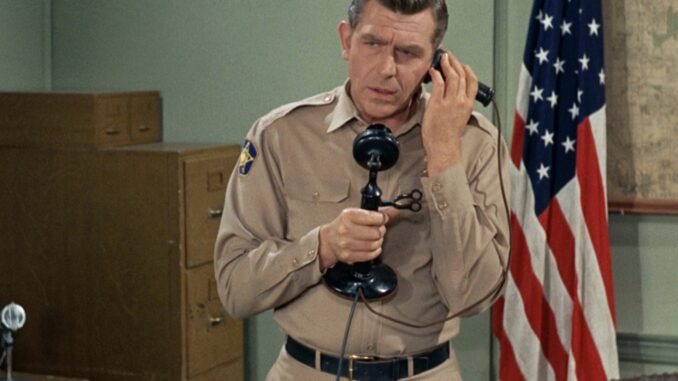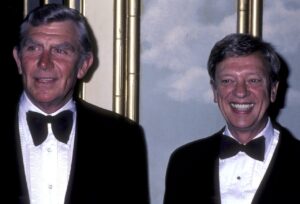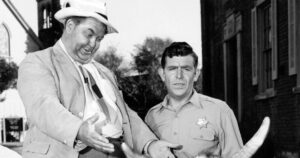
The Origin of Andy Griffith’s Doubts
A Star on the Rise
In the early 1960s, Andy Griffith was already a household name, known for his successful stand-up comedy and his starring role in the Broadway production of No Time for Sergeants. His comedic style and relatable persona endeared him to audiences, paving the way for a television career. However, the transition from stage to screen posed unique challenges.
Fear of Typecasting
Griffith’s primary concern centered around the fear of being typecast. After his success in comedy, he worried that taking on the role of a small-town sheriff might pigeonhole him in similar roles, limiting his future opportunities. Typecasting is a common plight for many actors, and Griffith was acutely aware of the pitfalls it could present.
Uncertainty About Television
At that time, television was still a relatively new medium. Griffith was uncertain about the longevity and viability of a television series. Would audiences embrace a show about a quaint, rural sheriff, or would it fall flat? His hesitation reflected broader industry doubts about the medium, especially regarding its potential to produce lasting, meaningful content.
The Script and Concept

A Unique Premise
When Griffith first read the pilot script, he found it charming but somewhat simplistic. The show was conceived as a spin-off from The Danny Thomas Show, where Griffith appeared as a character named Andy Taylor. The initial concept focused on the comedic elements of small-town life but lacked the depth that Griffith sought in a project.
The Influence of Friends
Despite his reservations, Griffith’s friends and colleagues encouraged him to consider the show seriously. They recognized the potential for something special. In particular, notable figures like Don Knotts, who would later become his close friend and co-star, believed in the script’s underlying warmth and charm.
Griffith’s Instincts
Ultimately, Griffith relied on his instincts. After some soul-searching and discussions with trusted friends, he decided to give it a shot, motivated by the opportunity to portray a character who could positively influence his audience. The potential to create a wholesome family show resonated deeply with him.
The Casting Decisions
The Role of Barney Fife
One significant factor that changed Griffith’s perspective was the casting of Don Knotts as Barney Fife. Knotts brought a unique energy and comedic flair that balanced Griffith’s more grounded portrayal. The dynamic between the two characters provided an avenue for humor while allowing for heartfelt moments, making the show more appealing to Griffith.
Building a Strong Ensemble
Griffith also understood the importance of a strong supporting cast. The addition of characters like Aunt Bee (played by Frances Bavier) and Opie (played by Ron Howard) enriched the narrative. The ensemble cast would contribute to the show’s charm, showcasing the various aspects of Mayberry life and deepening the viewer’s emotional connection.
The Show’s Evolution
A Shift in Focus
As the show developed, Griffith found that it offered much more than just comedic antics. The storytelling began to focus on moral lessons, community values, and the complexities of human relationships. Griffith’s character was not just a comedic figure; he embodied wisdom and compassion, traits that resonated deeply with viewers.
Embracing the Role
With the evolution of the script and character development, Griffith became more comfortable in his role. He recognized the opportunity to explore deeper themes while maintaining a lighthearted approach. This balance became the hallmark of the series and helped distinguish it from other sitcoms of the time.
A Cultural Impact
The Andy Griffith Show quickly became a cultural phenomenon, attracting viewers of all ages. Its portrayal of small-town life struck a chord, and the show’s humor and warmth transformed Griffith into an iconic figure. The series not only elevated his career but also solidified his legacy as one of television’s greats.
The Show’s Lasting Legacy

Beyond the Screen
The impact of The Andy Griffith Show extended beyond its air time. It spawned numerous spin-offs, merchandise, and a devoted fan base. Griffith’s portrayal of Sheriff Taylor remains a beloved part of American culture, embodying the values of kindness, integrity, and community spirit.
Griffith’s Reflection
In later interviews, Griffith reflected on his initial doubts and acknowledged how pivotal that decision was for his career. He often spoke about the joy the show brought him and the relationships he forged with his co-stars and crew.
Lessons Learned
Griffith’s journey from doubt to acceptance serves as a reminder of the importance of embracing opportunities. His story encourages others to consider the potential for growth and connection, even when uncertainty looms large.
Conclusion
Andy Griffith’s near-miss with The Andy Griffith Show is a testament to the unpredictable nature of show business. His initial reservations about typecasting, the television medium, and the show’s premise could have led to a vastly different trajectory for both his career and television history. Thankfully, Griffith’s decision to embrace the role of Sheriff Andy Taylor not only shaped his legacy but also provided audiences with a cherished slice of Americana that continues to resonate today.
FAQs
- Why was Andy Griffith hesitant to take on the role of Sheriff Taylor?
- Griffith feared being typecast and was uncertain about the future of television as a medium.
- What role did Don Knotts play in changing Griffith’s mind?
- Knotts’ casting as Barney Fife brought a dynamic energy to the show that Griffith found appealing.
- How did the show’s premise evolve over time?
- The show transitioned from a simple comedic concept to a narrative that explored deeper themes of morality and community.
- What lasting impact did ‘The Andy Griffith Show’ have on television?
- The series became a cultural phenomenon, influencing future sitcoms and creating a legacy that endures today.
-
What did Griffith reflect on later in his life regarding the show?
- He acknowledged that his decision to take on the role was pivotal and expressed gratitude for the joy and relationships it brought him.